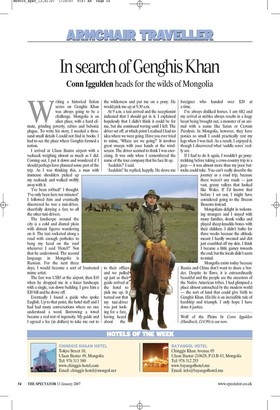In search of Genghis Khan
Conn Iggulden heads for the wilds of Mongolia Ivriting a historical fiction series on Genghis Khan was always going to be a challenge. Mongolia is an alien place, with a hard climate, grinding poverty, rabies and bubonic plague. To write his story, I needed a thousand small details I could not find in books. I had to see the place where Genghis formed a nation.
I arrived at Ulaan Baatar airport with a rucksack weighing almost as much as I did. Coming out, I put it down and wondered if I should perhaps have planned some part of the trip. As I was thinking this, a man with immense shoulders picked up my rucksack and walked swiftly away with it.
'I've been robbed!' I thought. 'I've only been here ten minutes!' I followed him and eventually discovered he was a taxi-driver, cheerfully denying a fare to all the other taxi-drivers.
The landscape around the city is a cold and dismal plain with distant figures wandering on it. The taxi rocketed along a road with enough potholes to bang my head on the roof whenever I said 'Hotel?' Not that he understood. The second language in Mongolia is Russian. For the next three days, I would become a sort of frustrated mime artist.
The fare was US$5 at the airport, then $10 when he dropped me in a lunar landscape with a single, run-down building. I gave him a $20 bill and he drove off.
Eventually I found a guide who spoke English Up to that point, the hotel staff and I had had many conversations where no one understood a word. Borrowing a towel became a real test of ingenuity. My guide and I agreed a fee (in dollars) to take me out to the wilderness and put me on a pony. He would pick me up at 9.30 a.m.
At 9 a.m. a taxi arrived and the receptionist indicated that I should get in it. I explained hopelessly that I didn't think it could be for me, but she continued waving until I left. The driver set off, at which point I realised I had no idea where we were going. Have you ever tried to mime, 'Where are we going?' It involves great sweeps with your hands at the windscreen. The driver seemed to think I was exercising. It was only when I remembered the name of the tour company that his face lit up.
`Juulchin?' I said.
`Juulchin!' he replied, happily. He drove me to their offices and we pulled up just as their guide arrived at the hotel to pick me up. It turned out that my taxi-driver was just looking for a fare, having heard about the foreigner who handed over $20 at a time.
I've always disliked horses. I am 6ft2 and my arrival at stables always results in a huge beast being brought out, a monster of an animal with a name like Satan or Certain Paralysis. In Mongolia, however, they have ponies so small I could practically rest my legs when I was tied. As a result, I enjoyed it, though I discovered what 'saddle sores' really are.
If I had to do it again, I wouldn't go ponytrekking before taking a cross-country trip in a jeep — it was almost more than my poor buttocks could take. You can't really describe the journey as a road trip, because there weren't any roads — just vast, grassy valleys that looked like Wales. If I'd known that before I set out, I might have considered going to the Brecon Beacons instead.
Mongolians delight in welcoming strangers and I stayed with many families, drank vodka and played sheep-knuckle-bones with their children. I didn't bathe for three weeks because the altitude meant I hardly sweated and dirt just crumbled off my skin. I think I became a little gamey towards the end, but the locals didn't seem to mind.
Mongolia exists today because Russia and China don't want to share a border. Despite its flaws, it is extraordinarily beautiful and the people are the ancestors of the Native American tribes. I had glimpsed a place almost untouched by the modern world — the sort of land that could give birth to Genghis Khan. His life is an incredible tale of hardship and triumph. I only hope I have done it justice.
Wolf of the Plains by Conn Iggulden (Hardback £14.99) is out now.






















































 Previous page
Previous page